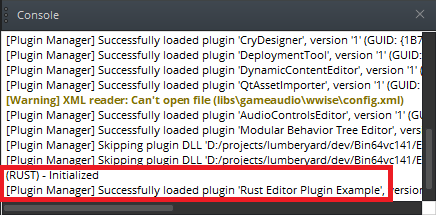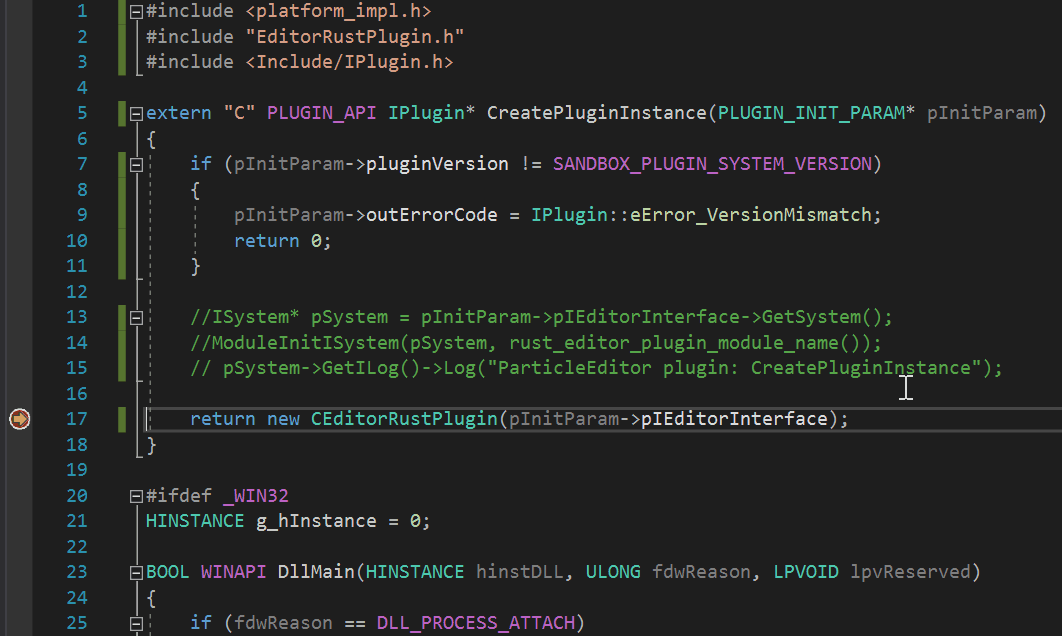With a Rust static library working in Lumberyard, let’s try something more interesting. The main content creation tool, Editor, has a plugin framework that would be an ideal way to gradually introduce Rust as part of normal development.
Editor Plugins
We haven’t yet found documentation in the Lumberyard User Guide on Editor plugins, but it’s pretty easy to figure out what’s going on.
TL;DR:
If we place a shared library in EditorPlugins/ that exports IPlugin* CreatePluginInstance(PLUGIN_INIT_PARAM*), we can get Editor to load and register our plugin.
Open one of the wscript files in Code/Sandbox/Plugins/ and you’ll see they use either the CryPlugin or CryStandAlonePlugin Waf module type (defined in dev\Tools\build\waf-1.7.13\lmbrwaflib\cryengine_modules.py). Plugin binaries are output to dev/Bin64vc141/EditorPlugins/, and if we take a look at the exported symbols:
dumpbin /exports Bin64vc141/EditorPlugins/MetricsPlugin.dll
# Output
1 0 000023E0 CreatePluginInstance = CreatePluginInstance
2 1 00002430 DetachEnvironment = DetachEnvironment
3 2 00002460 InjectEnvironment = InjectEnvironment
4 3 00002480 ModuleInitISystem = ModuleInitISystem
5 4 00002430 ModuleShutdownISystem = DetachEnvironment
For what happens at runtime, look at Sandbox/Editor/PluginManager.cpp (abridged here):
// 1. Load the shared library
QLibrary *hPlugin = new QLibrary(iter->m_path);
AZStd::string pathUtf8(iter->m_path.toUtf8().constData());
if (!hPlugin->load())
{
continue;
}
// 2. Get the address of `CreatePluginInstance()`
TPfnCreatePluginInstance pfnFactory = reinterpret_cast<TPfnCreatePluginInstance>(hPlugin->resolve("CreatePluginInstance"));
if (!pfnFactory)
{
continue;
}
IPlugin* pPlugin = NULL;
PLUGIN_INIT_PARAM sInitParam = /* ... */;
try
{
// 3. Call `CreatePluginInstance()` to obtain `IPlugin*` to plugin object
pPlugin = SafeCallFactory(pfnFactory, &sInitParam, iter->m_path.toUtf8().data());
}
catch (...)
{
continue;
}
Rust vs Polymorphism
TL;DR:
There’s no built-in support for passing objects much more complex than POD through Rust/C++ FFI.
Let’s take a look at IPlugin and other defines in Sandbox/Editor/Include/IPlugin.h
struct IPlugin
{
enum EError
{
eError_None = 0,
eError_VersionMismatch = 1
};
virtual ~IPlugin() = default;
// Releases plugin.
virtual void Release() = 0;
//! Show a modal about dialog / message box for the plugin
virtual void ShowAbout() = 0;
//! Return the GUID of the plugin
virtual const char* GetPluginGUID() = 0;
virtual DWORD GetPluginVersion() = 0;
//! Return the human readable name of the plugin
virtual const char* GetPluginName() = 0;
// <SNIP>
};
// Initialization structure
struct PLUGIN_INIT_PARAM
{
IEditor* pIEditorInterface;
int pluginVersion;
IPlugin::EError outErrorCode;
};
// <SNIP>
// Factory API
extern "C"
{
PLUGIN_API IPlugin* CreatePluginInstance(PLUGIN_INIT_PARAM* pInitParam);
PLUGIN_API void QueryPluginSettings(SPluginSettings& settings);
}
virtual functions. If you’ve worked in software a few years you’ve invariably run across an interview question about implementing vtables. The story in Rust:
- Rust has Trait Objects for dynamic dispatch
- Bindgen doesn’t support them (yet)
- Rust FFI prefers forwarding to C methods (see FFI Omnibus, use in Firefox, etc.)
- There’s crates like vptr with alternative implementations
Implementation
We ever-so-briefly contemplated manually building the vtable so IPlugin instances could be completely constructed in Rust. Instead, we’ll go the less brittle route and do C++ object creation in C++ via a “EditorRustPlugin” static library:
#include <platform_impl.h>
#include "EditorRustPlugin.h"
#include <Include/IPlugin.h>
extern "C" PLUGIN_API IPlugin* CreatePluginInstance(PLUGIN_INIT_PARAM* pInitParam)
{
if (pInitParam->pluginVersion != SANDBOX_PLUGIN_SYSTEM_VERSION)
{
pInitParam->outErrorCode = IPlugin::eError_VersionMismatch;
return 0;
}
//ISystem* pSystem = pInitParam->pIEditorInterface->GetSystem();
//ModuleInitISystem(pSystem, rust_editor_plugin_module_name());
return new CEditorRustPlugin(pInitParam->pIEditorInterface);
}
Where CEditorRustPlugin implements IPlugin and calls C functions exported by our Rust:
#include <Include/IPlugin.h>
// Defined in our Rust library
extern "C" {
void rust_editor_plugin_init(void* p_iSystem);
const char* rust_editor_plugin_module_name();
const char* rust_editor_plugin_guid();
int rust_editor_plugin_version();
const char* rust_editor_plugin_name();
bool rust_editor_plugin_can_exit_now();
void rust_editor_plugin_release();
}
// IPlugin implementation that calls C API
class CEditorRustPlugin : public IPlugin
{
public:
CEditorRustPlugin(IEditor* pIEditorInterface);
void Release() override
{
rust_editor_plugin_release();
}
void ShowAbout() override
{
}
const char* GetPluginGUID() override
{
return rust_editor_plugin_guid();
}
DWORD GetPluginVersion() override
{
return rust_editor_plugin_version();
}
const char* GetPluginName() override
{
return rust_editor_plugin_name();
}
bool CanExitNow() override
{
return rust_editor_plugin_can_exit_now();
}
void OnEditorNotify(EEditorNotifyEvent aEventId) override
{
}
};
Now the Rust side of the plugin. First, our Cargo.toml:
[package]
name = "editor_plugin"
version = "0.1.0"
edition = "2018"
[lib]
crate-type = ["cdylib"]
[features]
default = ["lmbr_sys"]
[build-dependencies]
lmbr_build = {version = "0.1", path = "../lmbr_build"}
[dependencies]
lmbr_logger = { version = "0.1", path = "../lmbr_logger" }
lmbr_sys = { version = "0.1", optional = true, path = "../lmbr_sys" }
log = "0.4"
Arguably the most important part is setting crate type to cdylib so we’re producing a shared library (*.dll).
In lib.rs:
use log::info;
use std::os::raw::{c_char, c_void};
const MODULE_NAME: &[u8] = b"Rust Editor Plugin Example\0";
const GUID: &[u8] = b"{98C1DC36-5D1E-4CF6-91CE-AFA1117CE81F}\0";
#[no_mangle]
pub extern fn rust_editor_plugin_init(p_isystem: *mut c_void) {
lmbr_logger::init().unwrap();
unsafe {
lmbr_sys::ModuleInitISystem(p_isystem, rust_editor_plugin_module_name());
}
info!("Initialized");
}
#[no_mangle]
pub extern fn rust_editor_plugin_module_name() -> *const c_char {
MODULE_NAME.as_ptr() as *const _
}
#[no_mangle]
pub extern fn rust_editor_plugin_guid() -> *const c_char {
GUID.as_ptr() as *const _
}
#[no_mangle]
pub extern fn rust_editor_plugin_version() -> u32 {
1
}
#[no_mangle]
pub extern fn rust_editor_plugin_name() -> *const c_char {
rust_editor_plugin_module_name() as *const _
}
#[no_mangle]
pub extern fn rust_editor_plugin_can_exit_now() -> bool {
true
}
#[no_mangle]
pub extern fn rust_editor_plugin_release() {
}
Note how we’re creating C-compatible null-terminated string literals with b"XXX\0".
ModuleInitISystem() needs to be called by each plugin to initialize globals and so on. In practice, we should call this from CreatePluginInstance() in the EditorRustPlugin C++ library since it’s shared by all Rust plugins, but we’ve got it here just to test calling some other C/C++ methods.
In build.rs:
use lmbr_build::*;
use std::{path::PathBuf};
fn main() {
// Helpers in lmbr_build to:
// - Map Lumberyard build configs to Rust build configs
// - Locate Lumberyard install path
// - Construct paths to Lumberyard resources
let config = build_config();
let config_3rdparty = if config == BuildConfig::Debug { "debug" } else { "release" };
let ly_root = PathBuf::from(lmbr_root().unwrap());
let bintemp = ly_root.join("dev/BinTemp").join(bintemp_dir());
let bintemp_fw = bintemp.join("Code/Framework");
println!(
"cargo:rustc-link-search=native={}",
bintemp_fw.join("AzCore/AzCore").display()
);
println!(
"cargo:rustc-link-search=native={}",
bintemp_fw.join("AzFramework/AzFramework").display()
);
println!("cargo:rustc-link-search=native={}",
ly_root.join(r"3rdParty\Lua\5.1.1.8-az\build\win_x64\vc140").join(config_3rdparty).display()
);
println!("cargo:rustc-link-search=native={}",
ly_root.join(r"3rdParty\zlib\1.2.8-pkg.2\build\win_x64\vc140").join(config_3rdparty).display()
);
println!("cargo:rustc-link-search=native={}",
ly_root.join("dev").join(bin_dir()).display()
);
println!("cargo:rustc-link-search=native={}",
bintemp.join("Code/Sandbox/EditorRustPlugin").display()
);
println!("cargo:rustc-link-lib=static=AzCore");
println!("cargo:rustc-link-lib=static=AzFramework");
println!("cargo:rustc-link-lib=static=lua");
println!("cargo:rustc-link-lib=static=zlib");
println!("cargo:rustc-link-lib=static=user32");
println!("cargo:rustc-link-lib=static=EditorRustPlugin");
}
This is mostly linking with Lumberyard dependencies as well as with “EditorRustPlugin” from above.
cargo build and if we check the functions exported by the resulting dll it certainly looks like it will satisfy Editor:
dumpbin /exports .\Bin64vc141\EditorPlugins\editor_plugin.dll
# Output
1 0 0001C930 CreatePluginInstance
2 1 0001C970 DetachEnvironment
3 2 0001C9A0 InjectEnvironment
4 3 0001C9C0 ModuleInitISystem
5 4 0001CB20 ModuleShutdownISystem
6 5 00001230 rust_editor_plugin_can_exit_now
7 6 000011D0 rust_editor_plugin_guid
8 7 00001060 rust_editor_plugin_init
9 8 000011A0 rust_editor_plugin_module_name
10 9 00001210 rust_editor_plugin_name
11 A 00001240 rust_editor_plugin_release
12 B 00001200 rust_editor_plugin_version
13 C 0000EA40 rust_eh_personality
Launch Editor and sure enough:

Very cool. Rust in all the things!
Something I get a kick out of, with Rust being “just native code” Visual Studio can step into and through it without plugins/extensions:

Common Problems
If you get error LNK2001: unresolved external symbol for CryAssert*() methods:
EditorRustPlugin.lib(rust_plugin_main.cpp.5844958.obj) : error LNK2001: unresolved external symbol "void __cdecl CryAssertTrace(char const *,...)" (?CryAssertTrace@@YAXPEBDZZ)
EditorRustPlugin.lib(EditorRustPlugin.cpp.5844958.obj) : error LNK2001: unresolved external symbol "void __cdecl CryAssertTrace(char const *,...)" (?CryAssertTrace@@YAXPEBDZZ)
EditorRustPlugin.lib(rust_plugin_main.cpp.5844958.obj) : error LNK2001: unresolved external symbol "bool __cdecl CryAssert(char const *,char const *,unsigned int,bool *)" (?CryAssert@@YA_NPEBD0IPEA_N@Z)
EditorRustPlugin.lib(EditorRustPlugin.cpp.5844958.obj) : error LNK2001: unresolved external symbol "bool __cdecl CryAssert(char const *,char const *,unsigned int,bool *)" (?CryAssert@@YA_NPEBD0IPEA_N@Z)
EditorRustPlugin.lib(rust_plugin_main.cpp.5844958.obj) : error LNK2001: unresolved external symbol "void __cdecl CryDebugBreak(void)" (?CryDebugBreak@@YAXXZ)
EditorRustPlugin.lib(EditorRustPlugin.cpp.5844958.obj) : error LNK2001: unresolved external symbol "void __cdecl CryDebugBreak(void)" (?CryDebugBreak@@YAXXZ)
Make sure at least one of the Lumberyard source files contains:
#include <platform_impl.h>
In Editor, if LoadLibrary() returns null and GetLastError() is 193 (0xC1- ERROR_BAD_EXE_FORMAT) make sure you’re building/running Lumberyard for x64, not x86. 32-bit applications can’t load 64-bit shared libraries (nor vice-versa).
Next Steps
We’re a little surprised linking to “EditorRustPlugin” works. According to this open issue, re-exporting C symbols in a cdylib doesn’t work. This might break unexpectedly and we’d like to better understand what’s going on here.
There’s yet another issue with bindgen failing on Lumberyard’s more convoluted templates. Ultimately, bindgen’s short-comings and pain related to polymorphic types may limit what we can do in Rust without exerting more effort.